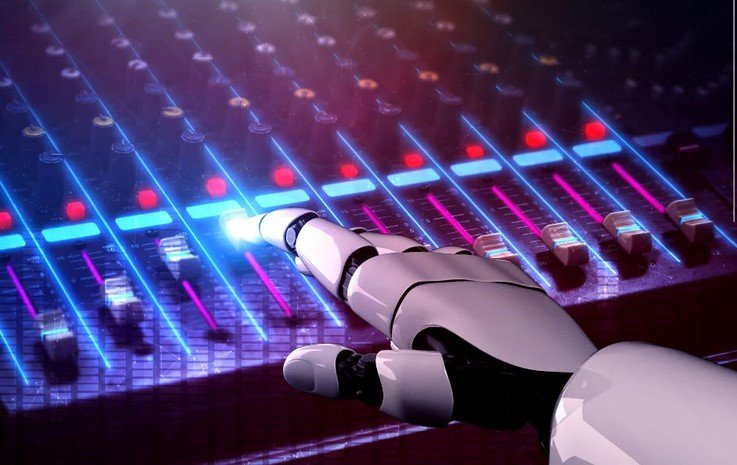Artificial intelligence (AI) is revolutionizing various industries, and the music world is no exception. The role of AI in music creation is expanding rapidly, from composing original scores to enhancing production techniques. This blog explores how AI is reshaping the way music is made, performed, and consumed.

AI Composing Original Music
One of the most exciting aspects of AI in music creation is its ability to compose original music. Through algorithms and machine learning, AI systems like OpenAI’s MuseNet and AIVA (Artificial Intelligence Virtual Artist) can create music in various genres. AI analyzes existing compositions to learn patterns, melodies, and harmonies, enabling it to generate new music that often mimics the style of human composers.
The role of AI in music creation here allows artists to explore new ideas and collaborate with AI tools to generate creative content. It also opens the door for non-musicians to produce music by simply inputting parameters into AI systems.
AI-Assisted Music Production
AI is also playing a vital role in streamlining music production. Tools like LANDR, an AI-powered mastering platform, allow musicians to upload their tracks and receive mastered versions instantly. Traditionally, mastering was a time-consuming process requiring expert engineers, but AI has made it more accessible and efficient.
AI-powered production tools, such as smart equalizers and automated mixing software, assist producers in fine-tuning their work by making intelligent suggestions based on the audio input. This role of AI in music creation helps producers focus on the creative aspects of music-making while AI handles the technical side.
Enhancing Music Performance with AI
AI’s role in live performances is also growing. AI-generated visuals and sounds enhance concerts by creating dynamic and immersive experiences. AI systems can respond to live input from performers, adjust lighting, and sound effects, and even generate real-time music.
Artists such as Holly Herndon have used AI-powered tools to create unique live performances. Her AI model “Spawn” collaborates with her to produce vocals and harmonies in real-time, showcasing how AI can actively contribute to live shows. The role of AI in music creation during live performances adds an interactive layer that was previously impossible.
AI and Music Personalization
AI’s impact on music creation isn’t limited to making music; it also plays a crucial role in curating and personalizing music for listeners. Platforms like Spotify and Apple Music use AI algorithms to analyze user preferences and create personalized playlists. These systems recommend new music based on listening habits, ensuring that users discover new artists and tracks that align with their tastes.
This AI-driven personalization has transformed the way people consume music, providing users with a unique listening experience tailored to their preferences. The role of AI in music creation, in this sense, expands into shaping the distribution and consumption of music, making it a central figure in the entire ecosystem.
Collaboration Between AI and Musicians
AI in music creation doesn’t aim to replace musicians but rather to augment their creativity. Many artists are now using AI as a collaborator to push creative boundaries. By leveraging AI-generated ideas, musicians can experiment with new sounds, genres, and arrangements. AI offers a fresh perspective that can inspire human creators to think outside the box.
For example, Canadian artist Grimes used AI to generate melodies and beats for her music, while French composer Benoît Carré collaborated with AI to create the album Hello World. The role of AI in music creation here serves as a collaborative tool, helping artists innovate and explore uncharted territory.
Ethical Considerations in AI Music Creation
As AI’s role in music creation grows, ethical concerns arise. One key issue is copyright and authorship. Who owns the rights to music created by AI? If an AI system composes an original score, does the credit go to the programmer, the AI, or the artist using the system?
Additionally, as AI systems become more capable, there’s a concern that they could diminish the value of human creativity. These ethical questions challenge the evolving role of AI in music creation and will require careful regulation and consideration as technology advances.
Conclusion
The role of AI in music creation is multifaceted, influencing everything from composition and production to performance and personalization. AI enables musicians to explore new creative possibilities, streamlines technical processes and enhances the listening experience for audiences. As AI technology continues to evolve, its impact on the music industry will only grow, offering exciting opportunities for artists and consumers alike.




